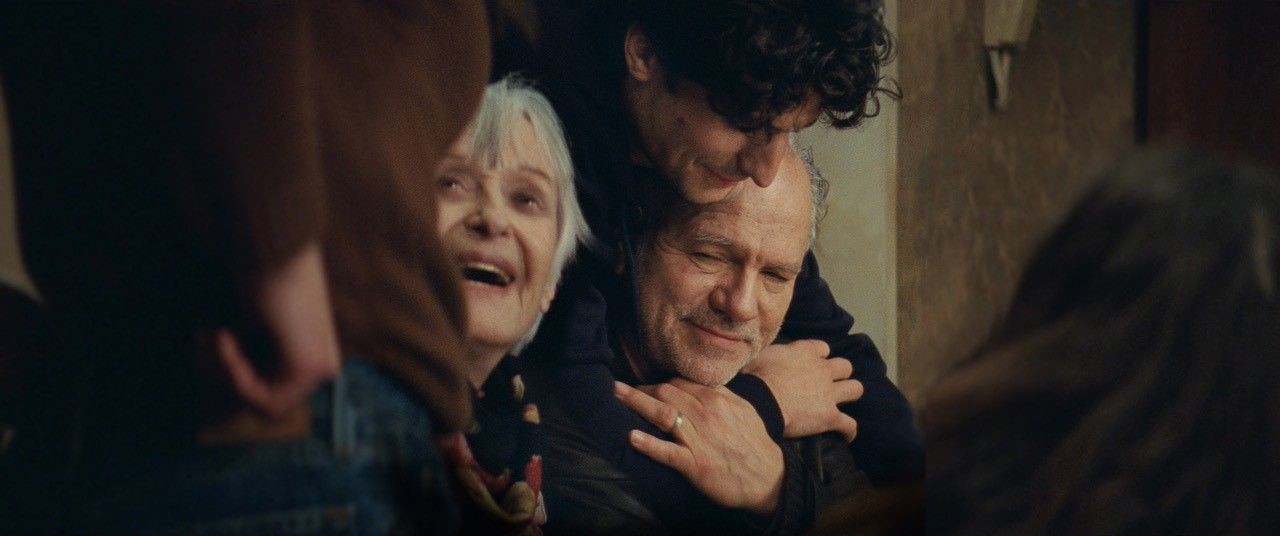In 1947, ten years before becoming an actor, Philippe Garrel’s father, Maurice, joined a company of puppeteers. That piece of history is like a well of inspiration in The Plough, Garrel’s latest cinematic family affair and a film as effortless as they come. It stars all three of Philippe’s children––Louie, Lena, and Esther––as brother and sisters; the patriarch role is filled by Louie’s godfather, Aurélien Recoing, whose own father worked alongside Maurice all those years ago. The grandmother is played by Francine Bergé––no relation, but maybe the performance of the lot. A briskly charming, bracingly anachronistic, sometimes achingly sensual film, it tracks the company in their late halcyon days as well as the siblings’ strained attempts to keep things going once their father dies.
Curiously, The Plough is Garrel’s first color film since A Burning Hot Summer, a maligned work from 2011 that was, in the end, the last film in which Maurice ever appeared in (he died July of that year, just months before Summer premiered at the Venice Film Festival). More joyful than solemn, The Plough pays tribute to him––even a sequence by the father’s graveside, in which his son removes the crucifix from his coffin and tosses it aside, is played with comedic élan. Louie stars as Louie, the eldest sibling and ostensibly the next in line to the throne, though he wishes to become an actor. Esther plays Martha, the most artistically dedicated to her craft and the one determined to keep the business going when her father passes. Lena plays Lena, a loyal confident to Martha. The drama is set in motion when the family’s easy equilibrium is disturbed: this comes with the arrival of Pieter (Damien Mongin), a comically self-involved artist and set designer who falls for the much younger Laure (Asma Messaoudene) and subsequently leaves his partner and newborn son.
That Pieter does so with all the care of a man changing suits speaks to the strange, anachronistic vibe of Garrel’s film––scratch a couple of moments in which mobile phones appear and it could easily be mistaken for a film from the late ’80s or early ’90s. As is, The Plough bumbles along like an old fossil, seemingly oblivious to contemporary mores or financial concerns. (Is it fathomable, say, that such a business could sustain the lives of all five family members as well as a few hangers-on?) Watching The Plough at Berlinale last week I kept thinking about how much it shared with Ira Sachs’ Passages: the pastel colors, the ridiculous love triangles, the characters’ scattered whims, and––most glaringly––a male character’s oblivious attitude towards his partner’s pregnancy. Yet when the protagonist of Passages swapped love interests for the umpteenth time I rolled my eyes; when Pieter embraces Louie here––for the first time since his friend has moved in with his ex and son, flippantly asking “so, how is my son doing?”––it’s delivered with so little irony you have to laugh.
Point being: Passages appears like a studied simulacrum of Franco-European cinema, whereas Garrel’s could have been written in his sleep. And that ease is nothing if not attractive. The director is refreshingly unpretentious in his depiction of artists’ lives––he might poke fun at Pieter’s narcissism, but it comes with a note of self-depreciation. (Tellingly, no one in the film doubts his talents; least of all Laure.) Garrel also delicately captures the work of the puppeteers, shooting them from behind the stage at shoulder level to show their dedication to this craft. So convincing is the portrayal you easily buy into the significance of this theatre and are soon concerned for its longevity––not least all the cluttered lives it holds together.
Awkward as it might be, Pieter’s relationship with Laure is directed with similar care. Garrel retains the ability to evoke vast things with quiet gestures, like when Pieter removes Laure’s scarf in an early sequence, just before a kiss. Garrel, a master director who turns 75 next month, has been making films since he was 16. Thematically, The Plough might be the artistic product of a life lived with fewer bills to pay (and I mean that in every sense), but there is something fascinating in such an unbridled approach. This film lives off the warmth between its actors but boasts a throwback charm that appears in keeping with recent resurgences of other seemingly past-it directors. It was interesting to see a Berlinale jury dominated by women (more than any major festival jury I can name) award Garrel the Silver Bear for best director. The Plough was easily the most out-of-touch film in competition. It was also one of the best.
The Plough premiered at the 2023 Berlin International Film Festival.

